The WES Mariam Assefa Fund and Tarsadia Foundation are thrilled to introduce the semi-finalists of the Opportunity Challenge: $1 Million to Uplift Immigrant Communities. Each one of these organizations is leading crucial initiatives that support the success of immigrants and refugees in their communities and build an inclusive economy for all.
After all 470 applications were reviewed for eligibility and programmatic focus, the Selection Committee evaluated the top 100 proposals and selected 20 semi-finalists, 12 of which were selected as awardees. These 8 semi-finalists proposed ideas that reflect the rich diversity, resiliency, and leadership found within immigrant and refugee communities and put forth a range of solutions to empower immigrant workers. Each semi-finalist received a prize donation of $25,000.
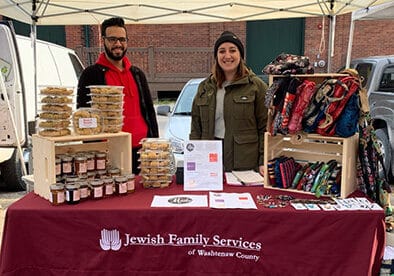
Jewish Family Services of Washtenaw County
Established in 1993 to assist the growing number of refugee families in Ann Arbor, Jewish Family Services provides programs and services ranging from older adult caregiving to immigrant resettlement and career services. The mission of JFS is to create solutions, promote dignity, and inspire humanity.
Project: The Micro-Enterprise Development (MED) program supports refugees and immigrants on the path to economic self-sufficiency by helping them develop, expand, and sustain microbusinesses. MED enables better understanding of the financial services industry and promotes economic empowerment and inclusion.
“Immigrants have been the backbone of small business in the United States for the past 200 years. This funding will have an impact by helping immigrants contribute their expertise to enriching and elevating us as a nation. While fostering economic empowerment, MED also provides opportunities for refugees and immigrants to build credit and capital—enhancing people’s mental health and well-being, sense of belonging, confidence, and self-esteem. As an additional benefit, the program promotes welcoming cities and counties and builds cultural connections between newcomers and host communities.”
Anya Abramzon, Executive Director, Jewish Family Services of Washtenaw County
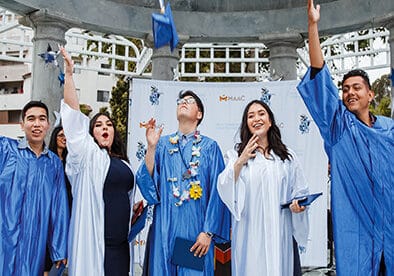
MAAC
Since 1965, MAAC has been a champion for underrepresented communities throughout San Diego County and has provided a space where individuals and families in need can find the means to self-sufficiency and improve their living conditions. Its focus has remained constant through the years: to assist individuals and families in creating the lives they want and deserve.
Project: Connect 2 Success, an evidence-based and replicable youth workforce development program embedded within an alternative charter school, to address poverty among immigrant youth or youth from immigrant families in the Southern Border Region of California.
“MAAC has a long-standing history of tackling challenges faced by immigrants through advocacy and responsive programming. Our youth workforce program, Connect 2 Success, aims to bridge the inequality and wealth gaps that exist in the Southern Border Region. Our potential impact extends beyond the individuals and their families who benefit from our direct services. By collaborating with higher education, industry, other service providers, and community members to address issues, we will create systemic change. Immigrant youth and families will have unprecedented access to opportunity—in education, jobs, housing, and care—leading to a better overall quality of life and more equity across our region.”
Arnulfo Manriquez, MAAC President & CEO
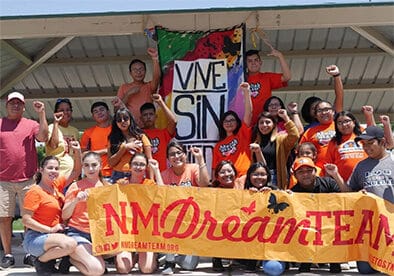
New Mexico Dream Team
New Mexico Dream Team is a statewide network made up of undocumented youth and allies whose mission is to create power for multigenerational, undocumented, LGBTQ+, and mixed-status families through education and economic justice, advocacy and organizing, and personal/leadership development.
Project: Support NM Dream Team’s Licensing for All program, which gives immigrants access to professional and commercial licenses in New Mexico by promoting a positive narrative about licensure access, working with state licensing boards to ensure compliance with recent legislation, and community organizing. This progressive legislation will have a significant statewide impact on the shortage of professionals in key areas of the state, be an economic driver for rural and poor communities in New Mexico, and disrupt racism in licensing.
“As an undocumented student and DACA recipient, advocating for SB–137 changed my life. Alongside the New Mexico Dream Team and partner organizations, I was able to advocate for myself and my community. Five months ago, I was a fourth-year medical student fighting for the opportunity to realize my dream of becoming a practicing physician. Now, I’m a first-year surgical resident providing medical care for New Mexicans in the middle of a pandemic.”
Yazmín Irazoqui-Ruiz, M.D.
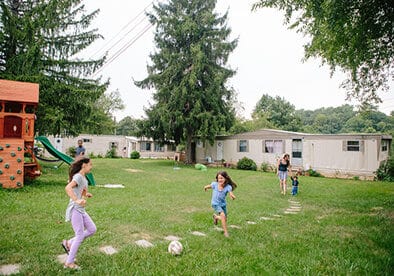
PODER Emma Community Ownership
PODER Emma Community Ownership works to create a cooperative economy and prevent displacement of legacy residents in the Emma community. Our work is centered on the belief that communities have the wisdom and experience needed to create powerful collective solutions to address the structural barriers that we face, and that cooperative development is an important part of creating community power and equity.
Project: The PODER Emma Cooperative Development Project provides network coordination, capacity-building, and development support to Latinx immigrant-owned worker, housing, real estate, and early childhood education cooperatives in the Emma community of Buncombe County in North Carolina.
“PODER Emma’s work is preparing our community to sustain its own development through cooperative assets and wealth. It is also creating a legacy for our children and creating tools to dismantle the systemic oppression that our community faces.”
Mirian Porras Rosas, Cooperative Developer and Loan Officer, PODER Emma
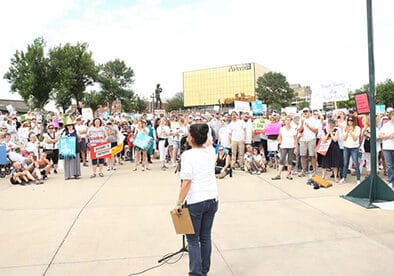
South Dakota Voices for Peace
South Dakota Voices for Peace provides legal services, advocacy, and civic engagement programming to lift the voices and power of immigrants, refugees, and Muslims, including undocumented residents.
Project: Ensure that immigrant workers understand their rights in the workplace and empower workers to enforce their rights while creating positive pressure on employers to comply with anti-discriminatory, worker safety, and wage and labor laws.
“When I was going through all of these things at work, I didn’t know what to do or who to go to. It was really my first job and I thought ‘maybe this is just how it is.’ South Dakota Voices for Peace was there to listen, and it has been therapeutic for me.”
Employee and client who believed she was being discriminated against at her workplace, South Dakota Voices for Peace
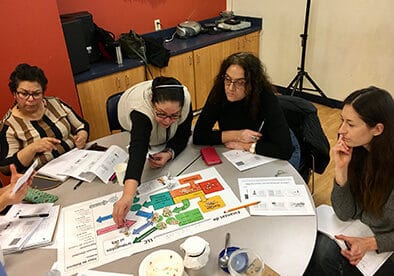
Sustainable Economies Law Center
Sustainable Economies Law Center cultivates a new legal landscape that supports community resilience and grassroots economic empowerment. It provides essential legal tools including education, research, advice, and advocacy so communities everywhere can develop their own sustainable sources of food, housing, energy, jobs, and other vital aspects of a thriving community.
Project: Support immigrants in their efforts to launch, co-own, and run their own cooperatively structured businesses, and create a favorable policy landscape in which those cooperatives can thrive in order to build lasting wealth within immigrant communities.
“Our vision is to create and support the growth of dozens of thriving, empowered, immigrant-owned cooperatives, where immigrant workers create their own jobs, have control over their workplace, and build community-owned assets through worker-led enterprises. Part of this vision will involve influencing laws and policies to support cooperative entrepreneurship. Our end-goal is a more just and equitable economy, where worker ownership allows immigrants, refugees, and other communities otherwise marginalized by our dominant economy to build economic, political, and community power.”
Charlotte Tsui, Staff Attorney and Project Co-Lead
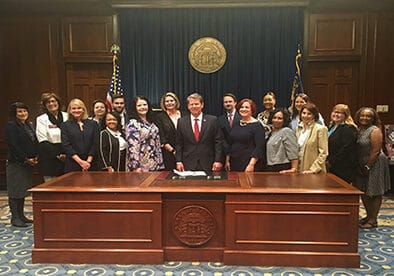
Tahirih Justice Center
The Tahirih Justice Center is a national non-profit organization that supports immigrant survivors of gender-based violence seeking safety and justice. Our holistic, interdisciplinary model of service combines free legal and social services with bridge-building policy advocacy, training, and education. We amplify the voices of survivors in communities, courts, and Congress to create a world where everyone can live in safety and with dignity.
Project: Help immigrant survivors of gender-based violence in their journey to access justice and economic opportunities by delivering free legal and social services through an interdisciplinary model.
“We’re excited to partner in our work to support immigrant survivors of gender-based violence seeking justice and safety in the U.S. The global pandemic has created especially difficult circumstances for immigrant women, girls, and others fleeing gender-based violence, many of whom are living with the effects of trauma or surviving ongoing abuse. Our holistic, interdisciplinary model enables immigrant survivors to resolve their legal needs and access services like medical care and shelter, paving a pathway to economic independence. This support will enable us to provide the essential services survivors of violence need during this critical time.”
Adriana López and Kursten Phelps, Co-Directors of Client Advocacy
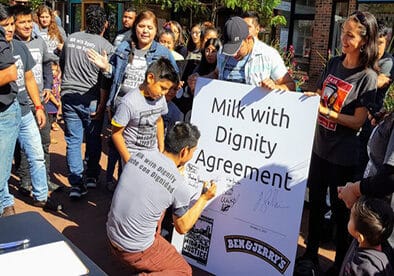
Worker-Driven Social Responsibility Network
The Worker-Driven Social Responsibility Network, together with its member worker groups and allies, builds understanding of the Worker-driven Social Responsibility (WSR) model, provides support for worker-led efforts to replicate the model, and shifts the existing paradigm to establish the model as the baseline for workers’ rights programs within global supply chains.
Project: The WSR Network’s U.S.-based members will work to expand and promote existing Worker-driven Social Responsibility programs in the agriculture and dairy industries and seek to reach new sectors, such as poultry and construction.
“In this moment, when the contradiction of essential work and disposable workers has been brought to the surface, the world is reckoning with its deep, chronic undervaluation of workers who make our lives possible. As a collaborative network led by worker organizations, we seek to expand a model that workers themselves have defined in order to shift the balance of power at work and transform the conditions in their industries, by ensuring decent wages and dignified work conditions through effective enforcement.”
Cathy Albisa, WSR Network Chair
Stay in Touch
Thank you for your interest in the WES Mariam Assefa Fund. We’ll share updates on the Fund’s efforts, what we’re learning, and opportunities through our email list.